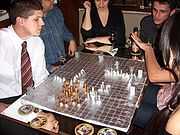SPIR608 Political Simulations and Gaming/2011/Week 2
< SPIR608 Political Simulations and Gaming < 2011Friday 28th January
- Week 2 Discussion of Guy Debord, The Game of War.
Game
10
Guy Debord's Game of War being played in Belo Horizonte, Brazil
Published as Le Jeu de la Guerre, 1987
* Is the design of the game's mechanics (board, pieces, cards, etc.) fit for purpose?
- the game is confusing at first sight, as we're not used to its mechanics;
- the game is serious, bold, adult, intellectual, mathematical;
- it would be a good idea to have the combat values for attack and defence on the pieces - maybe on the bottom of the pieces;
- the game is beautiful to look at, but it can be confusing as the board & terrain are the same colour as one of the two sides' pieces.
* Is the game enjoyable and sociable to play?
- yes, but not necessarily sociable - as it's a one-on-one game;
- it works surprisingly well as a team game;
- the game is time consuming - we didn't finish the game even though the class overran its time;
- the rules and principles were easy to pick up.
* What techniques does the game use to model its chosen subject?
- the game is about warfare in Napoleonic times;
- the main goal is keeping open your lines of communication;
- the best way to win the game is to keep your forces in groups;
- the game rewards correctly assessing the element of risk in your decision-making.
* How does the game combine abstraction and realism in its workings?
- the pieces are abstract;
- its strategic principles are realistic;
- the game doesn't involve luck which means that every move that you make counts;
- the game doesn't take into account weather and fog of war.
* How accurately does the game simulate the decision-making processes faced by the real-life protagonists of its chosen subject?
- the game is modeling the thinking processes of warfare;
* What political lessons can people learn by playing the game?
- its aim is to teach you to be a political revolutionary - but it isn't obvious how playing the game helps in this process;
- the game teaches military strategy rather than revolutionary politics;
- if politics is about gaining power and eliminating your opponents, then the game is very political;
- playing the game would have helped the people in Tahrir Square in their struggle against the Egyptian dictatorship;
- the game teaches people to think ahead;
- it teaches you to anticipate your opponents' moves;
- this is why Debord's game is more like chess than contemporary wargames.
* How would you improve the structure and mechanics of the game?
- the board and terrain should be a different colour than the pieces;
- Kriegspiel computer version can help in learning the game, especially as it does all of the calculations for you;
- the big problem with Kriegspiel is that it prevents you from making mistakes under pressure like accidentally moving out of supply;
- Alice Becker-Ho disapproved of the computer version of the game;
- it's a good game because it's challenging to play;
- the two teams should be separated so they can have confidential conversations although we were able to communicate secretly by passing notes to each other;
- this openness could be a political element of the game as it replicates espionage!
Links
- Photos of Week 2 game playing
- Alice Becker-Ho & Guy Debord, The Game of War.
- Class Wargames
- Film: Class Wargames Presents Guy Debord's The Game of War.
- Film: Class Wargames представляет: Игра в войну Ги Дебора.
- Radical Software Group, Kriegspiel.
- Alexander Galloway, Debord's Nostalgic Algorithm.
- Nathan Heller, What Is It Good For?.
- Gene McHugh, Battle Code.
This article is issued from Wikiversity - version of the Monday, February 07, 2011. The text is available under the Creative Commons Attribution/Share Alike but additional terms may apply for the media files.
